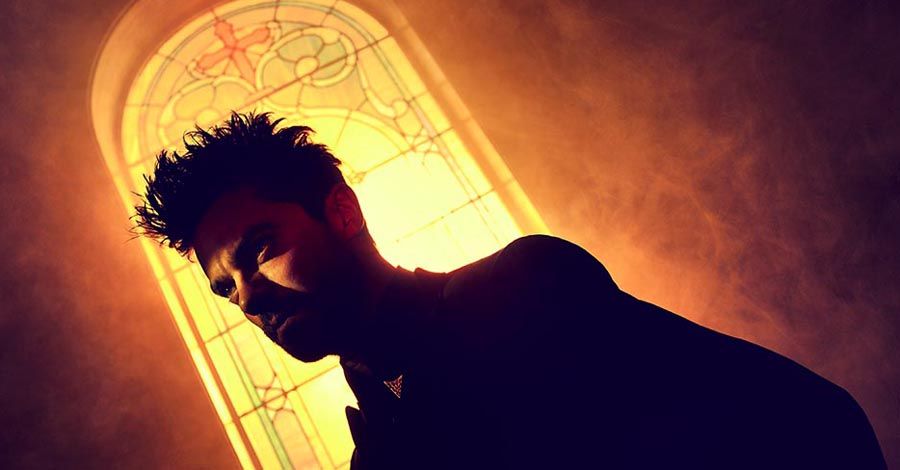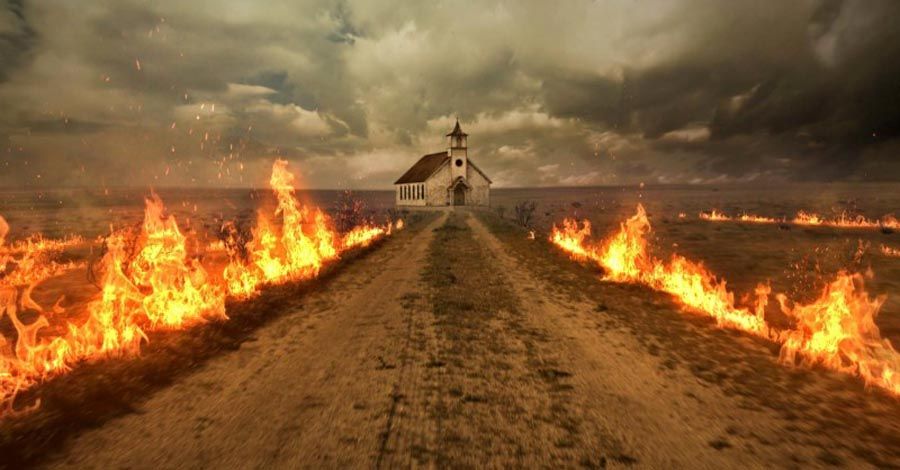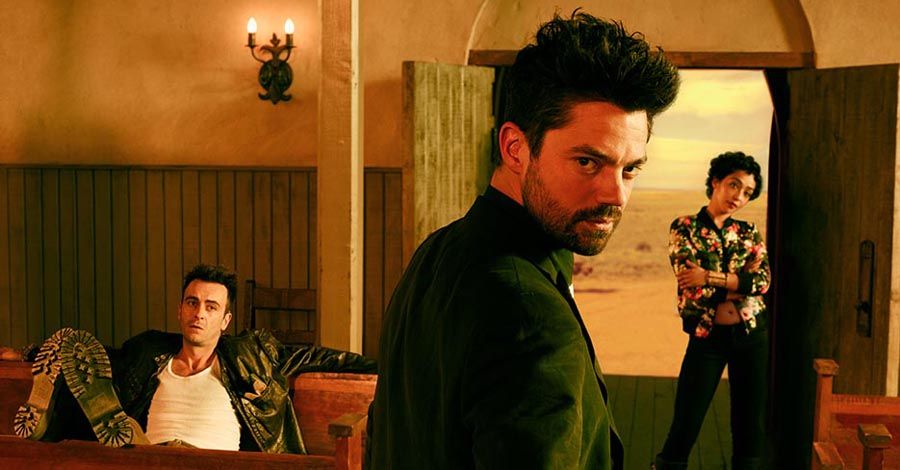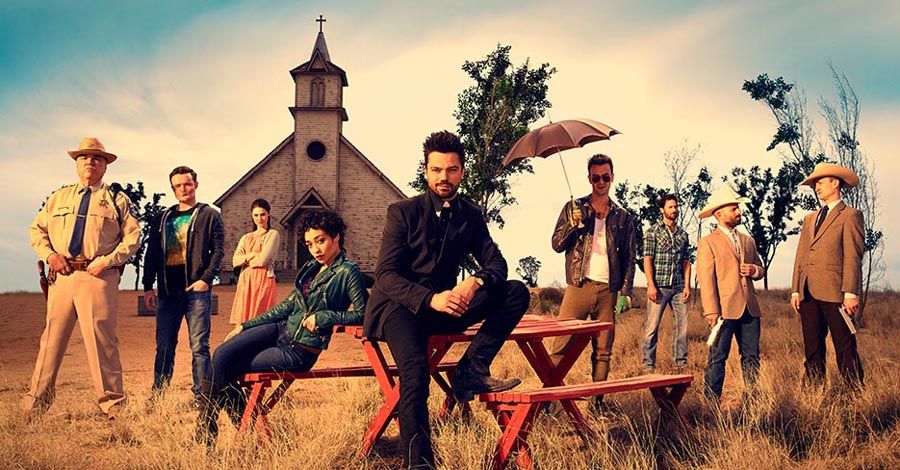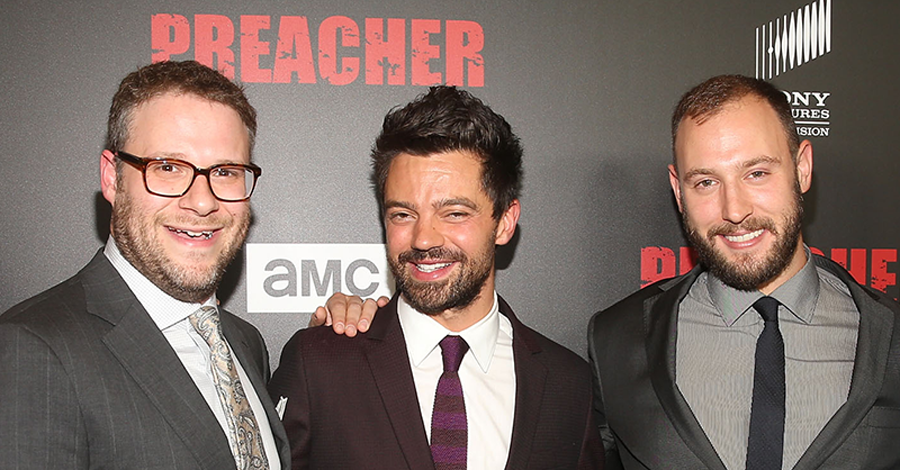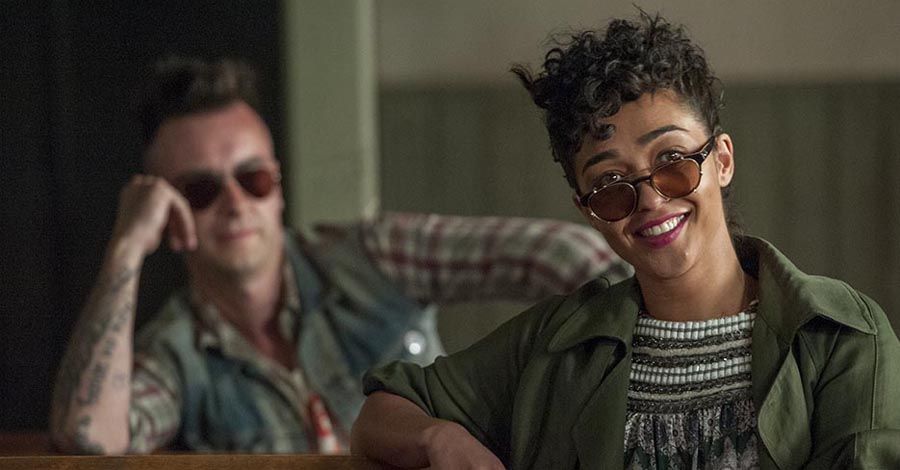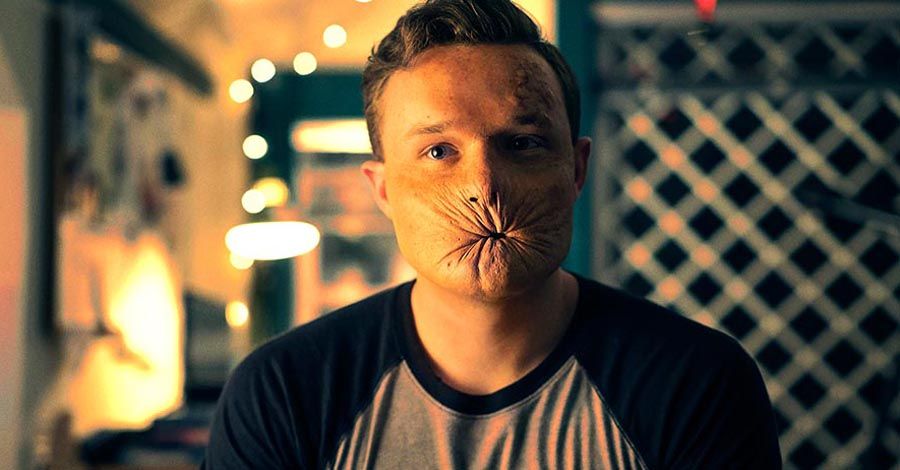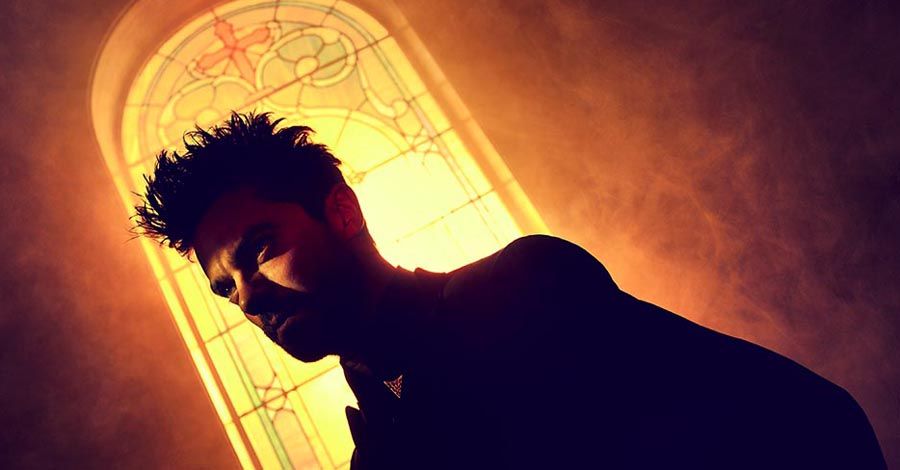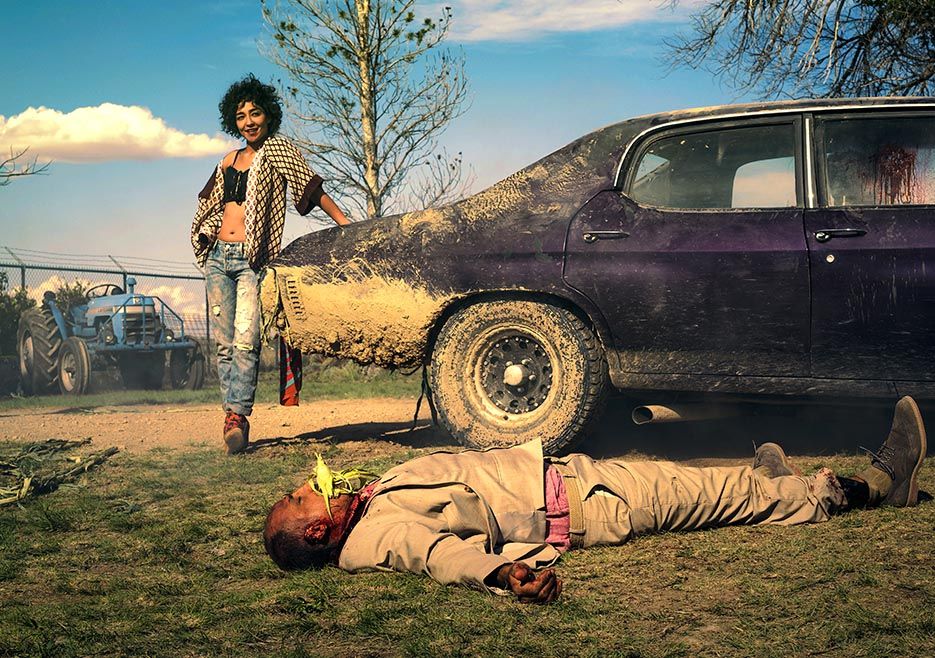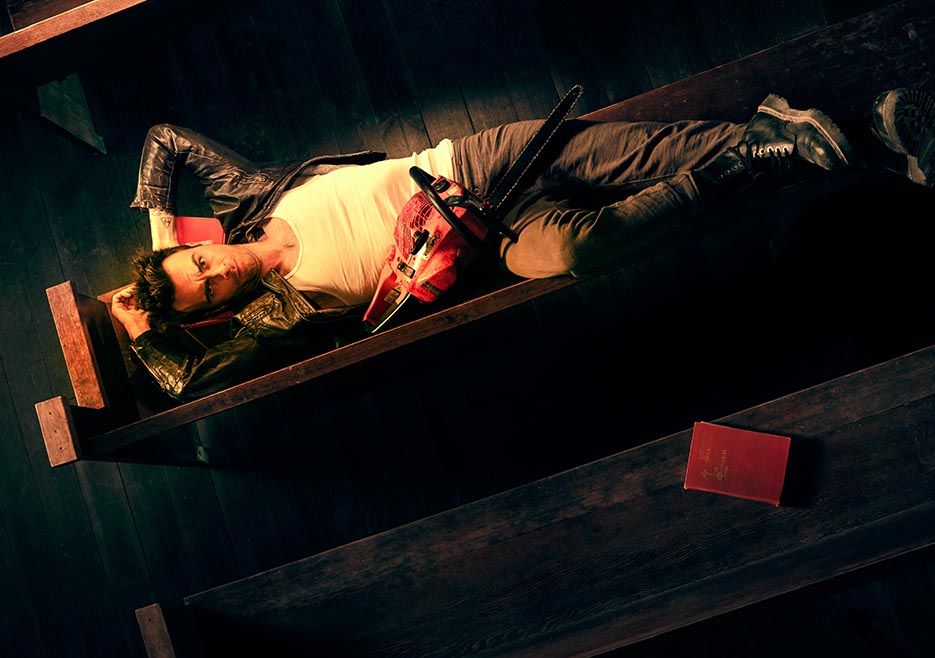As the writers and producers of projects like "Superbad," "Pineapple Express," "This Is the End" and "The Green Hornet," childhood friends Seth Rogen and Evan Goldberg have long let their fanboy flags with both direct and subtle references to the comics they grew up loving. And now they're delivering the gospel of "Preacher," the acclaimed Vertigo series by Garth Ennis and Steve Dillon, in a new no-holds-barred television drama on AMC.
As executive producers, alongside "Breaking Bad" standout Sam Catlin, and co-directors of the initial two episodes, the comedy duo is venturing deeper into more twisted, pitch-black funny and hyper-violent territory than ever as they adapt the seminal comic book.
Rogen and Goldberg recently joined journalists to reveal exactly how and why the epic journey of Jesse Custer, Tulip O'Hare and the vampiric Cassidy was a road trip they wanted to take on television.
On the long Road to "Preacher"
Seth Rogen: The first time we had a meeting for it was as soon as we were able to have a meeting for something like this. I think it was when we were filming "Pineapple Express." So it was before any movie we had made had come out, really ...
Evan Goldberg: Which gave you little reason to go with us ...
Rogen: Exactly. We were just kind of like picking up some momentum as writers. And so, we were like, "We're writers now! We're making an action comedy! Maybe they'll let us do 'Preacher!'"
I remember we actually showed them the fights from "Pineapple Express" in Danny McBride's house, to show them that we could execute action ... and I think they were like, "Oh, OK." And then they gave it to, I think, Mark Steven Johnson or something like that around that time. And it passed through a lot of hands.
REVIEW: AMC's "Preacher" Takes Bold Risks That Pay Off Big
I know Sam Mendes was involved with it at some point. I think David Fincher was circling it at one point or another. Yeah, there were just a lot of iterations of it, and we just always were just very vocal to our agent or to whoever was around who would listen to us. But it was something we were big fans of and that we thought we could do a good job of adapting in some way.
And then we met [producer] Neal Moritz on "The Green Hornet," and we actually developed a very good relationship with him. And he started controlling the property eventually. And he had heard us talk about it nonstop ...
Goldberg: He still tried to make it with, like, two other people!
Rogen: Yes, exactly. Part of me thinks he only ever got the property in the first place because he heard us talk about it a lot, then still tried to make it with two other people, who then did not do it, and then eventually it still found its way back to us, which I've not called him on.
So then eventually it fell in our laps. By that time there is a thing called cable television that was very popular, and it allowed us to do that.
Goldberg: Yeah, we initially thought that it would be like a "Band of Brothers," kinda 10-part miniseries, because that just seemed logical, because shows like this didn't exist then at all.
Rogen: Yeah, there was just no giant but huge-scale show.
Goldberg: And then when it was in movie format, it was just too brief. It didn't make sense as a movie and there was no time to jam it all in.
On the aspects of "Preacher" they first fell in love with
Rogen: It kinda reminded me of "Hitchhiker's Guide to the Galaxy," which we also both love. It creates a world where anything is possible and anything can happen. But, again, it's all very character driven and character based. And it's very funny.
And it's also very fucked up, which, especially at the time that we read it, we were obsessed with "Pulp Fiction" and Quentin Tarantino and the Coen brothers. Peter Jackson we loved, "Devil Eye" we would watch, and Sam Raimi's movies. It just kinda had all that in one thing.
Goldberg: Part of the beauty of "Preacher," with Garth Ennis, is he is not from America, but he loves America and is obsessed with it and now lives here. And it's a lot of his childhood watching John Wayne and stuff like that impacted how he wrote the comic. And, for us, I think it's a similar thing.
Rogen: It's a similar thing. When you are Canadian, you kinda know America from movies ... I think when you look at the comic, it very much is like a cinematic perspective of America. I think he picked a few American movies he loved and kind of used that as, "This is America."
When we were growing up it was very similar. I think it was things like "Clerks" and "Pulp Fiction" and Wes Anderson movies started coming out when we were in high school, and we would look at those things and be like, "America ..." [laughs]
RELATED: 10 "Preacher" Comic Book Scenes Too Shocking For TV
Goldberg: And I think Garth captured it in the comic, and it's something that I think most people would agree, that America is just the craziest place because there's extremes of everything. It's like Texas and New York are both in America. It's just a crazy country with a lot of story to tell. I think that's one of the reasons he's gravitated towards it.
Rogen: But at its core it's really a Western, which is funny. Before we started making the pilot, we didn't really watch a lot of Westerns, honestly. If you asked us, "Are you fans of Westerns?" I would not have said yes.
But then you start watching all these old Westerns and you start realizing, "Oh, well we are fans of a lot of directors who rip off all these Westerns." [laughs] And so, we very much understood the cinematic language of these Westerns and the look of these old Westerns as we watched them all. We were just like, "Oh, Scorsese does that. Oh, Tarantino does that. Oh, the Coen brothers do that." As you start watching these John Houston movies, and "The Wild Bunch" could not be more out of some of the handbooks of some of the stuff that's out there today.
And so, it was funny to look at that and be like ... It's like when we watched "The Last Detail." We had already written "Superbad," but we were like, "Oh, we somehow ripped off this movie, even though we had never seen it, just because we must have been ripping off movies from people who had seen it."
On interacting with the comic's creators
Rogen: We just had coffee with Steve Dillon! [laughs] He gave us a panel from the "Preacher" cover that he drew, which is one of the coolest things I've ever seen. We talked to Garth quite a bit. He came to our initial pitches for the show. He reads everything that happens. He watches every cut.
Goldberg: And then he just has two or three notes, very minimal, always right.
Rogen: Yeah, but he was a big advocate of taking a new path to allow a new audience to discover the show and not strictly adhering to the comics...
Goldberg: We were proposing that we do an extremely similar to the comic version. And he told us that was stupid and that we should change it...
Rogen: Yeah, he was one of the first people to actually say it. I think everyone was afraid to say it, and we were all maybe thinking it. And I think he was the one who was just like, "You can't just do this." He was like, "I don't even think it would time out." He's like, "I don't think you would get enough episodes. You have to change it. It just wouldn't become a TV show ..."
Goldberg: Yeah. He just said, "As long as you don't change the core emotion of the main characters and that they are somewhat true to the comic characters."
On the tweaks, changes and new directions in the series
Goldberg: Well, Tulip is African-American. That's a difference. And a little sassier, I would say ...
Rogen: [laughs] She's a little more volatile, I think, in a lot of ways than the comic. We changed the Arseface backstory to some degree. We changed his relationship with his father to some degree.
The biggest thing we did is you don't see him ever being a preacher in the comics. And we were just like, "It's called 'Preacher.' He's dressed as a preacher the whole time. Maybe you should see him being a preacher." And so, we thought it would...And when the comic starts, he's done with it, basically. So we thought it would be good to kind of show what that part of his life was like as well.
RELATED: Cooper, Negga & Catlin Spread "Preacher's" Gospel
Goldberg: And then minor things, like we changed how Eugene's face looks, and we don't have sunglasses on Cassidy all the time, because we want to see their eyes so they can act. Just practical things like that.
Rogen: There's a million and one things where, if you are a big fan of the comic, that will be devastating, I think. I think you'll get over it. [laughs] I think all the big stuff, honestly ... I think fans of the comic, as the season progresses, will be more surprised at how much stuff they hope we're including we will be including, as opposed to how little, honestly.
Goldberg: All we ever say about this is if you are a fan of the comic, you are probably not going to be upset at the end of the whole run, and you also won't be able to predict what's going to happen. It's a fine balance that we've got to hit where, no matter how familiar you are with the comics, something is going to happen you are not expecting.
Rogen: I think that's the exact goal, is to satisfy both of those ideas - make a good show and make everyone happy.
On casting Dominic Cooper as Jesse Custer
Goldberg: We met with tons and tons and tons of people for that role, and we eventually realized that to get someone who's really about to pop and is at their height, you have to just offer it to someone based on just a sit-down, which we're not used to. We're used to auditioning and working and seeing if it works. And we sat down with him and we talked about it for a half hour, and he just fully got it, thought it was awesome, and we just dove in with him.
And him being British is not a problem for us. But, man, does he have to practice. I imagine he's got it down now, but on the pilot, between every take he was like, "Now, what do you mean? Now, what do you mean? Now, what do you mean?"
RELATED: "Preacher's" Joseph Gilgun Explains Why He's The Perfect Pick For Cassidy
Rogen: But I was a big fan of his. I probably was the one with the most ... I was on a long flight once and I watched ["Fleming"], that entire James Bond BBC series, the Ian Fleming show. And I thought it had a lot of ... he was kind of cool, but he was funny, and he was kind of a badass at times, but he was like also a little kind of aloof at times in it.
And I'd seen that "Devil's Double" movie. He just seemed very versatile. And I remember the first "Captain America" movie, seeing him and being like, "Who's that guy?" he really stood out to me. He's just one of those guys I always thought would be good to work with.
On bringing "Preacher's" more out-there aspects to TV intact
Rogen: If anything, I'm surprised at what we've been able to do.
Goldberg: I think we're old enough to permanently be shocked by everything they let us do. It's like, "You couldn't do that shit when we were kids!" It's crazy! 'The Walking Dead' is insane!
Rogen: Yeah. 'The Walking Dead' actually has provided a lot of good precedent for us to do a lot of stuff that we wouldn't be able to do. [laughs]
Goldberg: The interesting thing is it's actually always about story with Standards and Practices, and they are much more reasonable, and they've actually helped us make things better, which is the weirdest. ... We're used to being like, "Fuck MPAA!"
RELATED: "Preacher" Artist Steve Dillon Says AMC Series Has "A True Feel" For The Comic
Rogen: Don't say that! [laughs] Yeah. The MPAA are great people! We appreciate all their [input]. [laughs] Yeah, it's nice to be able to have a conversation. That is the other thing with the MPAA, is we never have the conversation. You submit your stuff, you get notes back. If it actually gets a rating that we're not hoping for, and then you just kind of cross your fingers and resubmit it, basically.
But with this, yeah, they call, and you talk, and you explain, like, "Here's why we're trying to do this. Here's what we like about it." Pretty much every time we've gotten to do exactly what we wanted.
On the show's carefully scripted, and elaborately staged, action sequences
Rogen: I feel like we've directed a lot of action-y stuff in our moves, big visual-effects sequences, but I feel like we've never done a fight scene that we were incredibly proud of. And so, we really liked this idea, especially in the pilot, of each character kind of getting a fight that defines their character in some capacity.
As fans of action movies, it was always disappointing when would watch our fight scenes. We were not completely thrilled with them. So we just put a huge amount of thought and energy and time into really thinking of how to differentiate them, and stage them, and choreograph them, and shoot them, and to really try to get it to a standard that we ourselves were incredibly proud of.
I used to think in 'The Interview' there's some very good action, but I think the fight scenes are not fantastic. And 'This Is the End' has some cool visual-effects sequences, but there's like a fight scene that's a little wonky in it. This was the first time I really think we were aware of it and we locked it in place in a way we never have before, I think.
On the sly Tom Cruise joke in the pilot
Goldberg: The Tom Cruise thing is a hilarious joke that we love. And we hope Tom Cruise enjoys it. But I don't know.
Rogen: I would think it was funny if someone blew me up. [laughs]
Goldberg: There's no negative connotation to it. We're not making a statement.
Rogen: And it's funny, because I've found myself face to face, obviously, with a lot of [celebrities]. ... Our humor often involves a lot of pop-culture references and references to actual people that I, as a person in Hollywood, have then found myself face to face with quite often. [laughs] We only really make people that we are big fans of, because it would actually just feel too mean to make fun of people that we don't like. And I need to be able to go up to them and be like, "It's because I like you!"
I'm like the biggest Kanye West fan on the planet, and I've probably made fun of him almost more than anybody on a very large scale. And he gets it and thinks it's funny. And so, my hope is that people get it and that when we do something like that, it's truly because we are [fans]...I'm a huge Tom Cruise fan. I see every Tom Cruise movie that comes out. "Edge of Tomorrow"" One of the best fucking movies ever. [laughs]
On the moments in the early episodes where they really feel they'd nailed what they'd set out to do
Goldberg: For me, when Tulip is with the two children. That scene is ... just the music, and the lighting, and the acting. I'm a big fan of that one.
Rogen: There's some stuff in the second episode that I actually really love as well. The chainsaw. There's just a few moments with the chainsaw that remind me of some of my favorite movies from when I was a kid that were fun to do and fun to watch. And I'm amazed that it remotely worked in any capacity. And we had so little time to shoot it. It's just so crazy. It's one of those things where I still watch it and am just like, "Wow. This is bonkers." And that's what "Preacher" should be. I think that's what's fun about it.
"Preacher" premieres Sunday at 10 p.m. ET/PT on AMC.

